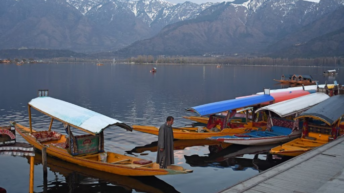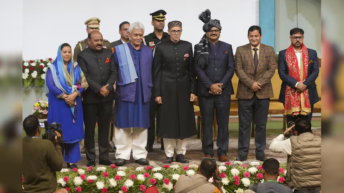|
Listen to article
Getting your Trinity Audio player ready...
|

The latest political developments in Nepal include Prime-Minister K. P. Sharma Oli’s dissolution of the House of Representatives (Pratinidhi Sabha) rather hastily and surreptitiously two years ahead of the conclusion of its term, by bringing in amendments which clearly violate the country’s Constitution promulgated on September 15, 2015. Quite naturally, when landlocked Nepal located between the world’s largest democracy and the world’s largest Communist nation encounters political unrest, it disturbs domestic stability, but it also triggers international concern.
Prime Minister Oli’s decision of changing Nepal’s national flag to show Indian territories included in Nepal was a retaliation for India’s construction of a road in May 2020 from Drachulla in Uttarakhand to the Lipulekh Pass, just four kilometres from Tibet, facilitating easier access to Kailash Mansarovar. The fact that Oli is feeling the political heat has made many in India feel upbeat and political sagacity dictates that such attitudes do not augur well for India’s sound long term relationship with Nepal. India should not lose sight of the fact that Oli’s moves were desperate attempts to win over domestic politics and thereby enlist their support to remain firmly in the saddle.
Indian diplomacy should explore avenues to clarify India’s position. This is by no means to suggest that India should relinquish its territorial claims and compromise on its sovereignty. India should strongly convey to Nepal that the new road also serves the long-term interests of Nepal but India should await the politically right time for doing so.
The current developments do favour Oli’s detractors, opposition parties in general and the main opposition party the Nepali Congress in particular. But one should be under no illusion and erroneously assume that Nepal has completely taken a U-turn in its directional drift towards China. Under no circumstance should India convey an impression of rejoicing at Nepal’s present political troubles.
According to a vast cross-section of people, Nepal does not wish to become a playground for China or India or the United States by making any change in its independent foreign policy. That is Nepal’s view, however to an objective analyst viewing the ground realities, Nepal has been within its northern neighbour’s embrace ever since the Sino-Nepal Peace and Friendship Treaty was signed on April 28, 1960.
This accord facilitated a meeting between Nepal’s then Prime-Minister B. P. Koirala and Mao Zedong leading up to a border agreement which delineated the Sino-Nepal border. Nepal thus became the first among China’s neighbours to agree on border demarcation with the former. This was a strategic jackpot and a defining watershed moment for the PRC, because from then on it was able to wean Nepal from “India’s stranglehold” thus far. These bonds gained further momentum after China invested in the Kathmandu-Kodari Highway in the early 1960s, which, in recent years, has further consolidated through the Belt and Road (BRI) initiative. President Xi Jinping’s visit to Nepal in Oct 2019 was followed by a colossal economic package linked to BRI covering rail connectivity, fuel and energy and hydro-electric development et al.
China, over the decades, has also been disseminating its way of life, language and culture in Nepal. Recently PRC has decided to fund the salaries of school teachers teaching Mandarin in Nepalese schools. Back in 2018, China helped the Oli and Pushpa Kamal Dahal alias Prachanda factions of the existing Nepal Communist Party to form a united front. This unity was given further impetus by Beijing’s Ambassador in Kathmandu who worked hard to forestall any damage to this coalition.
Twelve petitions against Oli’s “unconstitutional” dissolution of the House of Representatives are awaiting judgment. The apex court has issued a show-cause notice to Prime-Minister Oli on December 25, 2020. He had been given ten days time to give a reply.
On December 31, 2020, Republica.com published an article What next in Nepal? written by a knowledgeable analyst Suraj K Shrestha. He has unfolded four likely scenarios which could emerge depending on how the Supreme Court decides the case. These are:
- If the Supreme Court reinstates the House a state of emergency will be declared –this may make Oli join hands with pro-democracy forces which have been demanding a constitutional monarchy and a Hindu State.
- If China is able to enforce its writ on Nepal, Oli and Prachanda will make amends and arrive at a modus vivendi
- Right after the Supreme Court orders the reinstatement of the House, a State of Emergency may be declared and the Nepalese Army would very likely be deployed before a vote of no confidence is registered against Oli. Whereafter, he may join hands with pro-monarchy activists seeking reinstatement of Constitutional Monarchy and a Hindu State.
- The Supreme Court will uphold the dissolution and elections will follow. The Nepali Congress may secure a majority and Sher Bahadur Deuba, a former Prime-Minister may yet again become the Prime-Minister.
Conclusion:
Right now, both the warring factions of the Nepal Communist Party are claiming legitimacy and entitlement rights and have separately approached Nepal’s Election Commission for granting the Nepal Communist Party’s election symbol to their respective faction.In the aftermath of the dissolution of the House of Representatives, Nepal has witnessed some street protests and stray incidents of violence. As regards the two-phased election set for April 30, 2021, and May 10, 2021, there is some skepticism and many within Nepal including Mr Dinesh Thapaliya, Nepal’s Chief Election Commissioner opine that holding the elections is a challenge and everything would depend on how the situation evolves. A former Chief Election Commissioner Mr Ayodhee Prasad Yadav says the challenge becomes clear because most political parties are against holding parliamentary polls.






Add comment